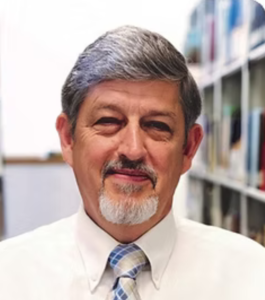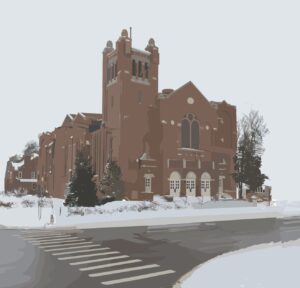About Us
Who We Are:
Byron Center Protestant Reformed Church was organized officially on October 20, 1983. Our congregation belongs to the denomination of the Protestant Reformed Churches in America. The Protestant Reformed Churches are a denomination of 32 churches with over 8,000 members based in the United States and Canada.
Our Pastor

The path that our pastor took to becoming the minister of Byron Center PRC was interesting and varied. The first vocation to which God called him was that of a teacher of grades 6 through 8 in a small Christian school where he also served as the administrator. Although he thoroughly enjoyed teaching, he became convinced of the
call to the ministry. He left teaching after four years to enter seminary for training. Thus it was that at the age of 32, he took the first call to a congregation. Having served as pastor of two congregations (ten years total), Prof. Dykstra accepted the appointment to the position of professor of Church History and New Testament
studies. He served in the Protestant Reformed Seminary for 26 years before nearing retirement there and accepting the call to the congregation of Byron in 2021. Prof. Dykstra gratefully acknowledges that all along the way, he been supported by his dear wife, Carol. The Lord has blessed them with nine children and many grandchildren. Both attest that they are thankful for the opportunity to serve the congregation of Byron.
Our History
The original Byron Center Protestant Reformed Church (BCPRC) was formed in 1929. The congregation enjoyed Rev. George Ophoff as her faithful minister from 1929-1945, at which time the church disbanded. The Byron Center PRC had its second beginning when a group of Protestant Reformed adults from the Cutlerville/Byron Center area met in the library of Byron Center Township in the spring of 1981 to study the Canons of Dordt. From this class, the Hudsonville PRC consistory took a survey of how many were interested in starting a Protestant Reformed church in the area.
At a meeting held in March of 1983, 21 families indicated they were indeed interested in starting a new church. A feasibility committee of nine men was chosen to contact these families and draw up a budget. A meeting was held in April when a request was filed with the stated clerk of Classis East to seek approval to form a new congregation. The plan was for Hudsonville PRC to oversee the activities until Classis approved the request. Worship services began on August 7 at the Byron Center Christian Junior High School. Approval from Classis came on September 14. An organizational service was held on October 20, 1983, with 22 families and two single men making up the church family of the new Byron Center Protestant Reformed Church.
The Lord richly blessed these members by providing a new church building in Byron Center. The first services were held on August 14, 1988, with 41 families and seven individuals. In 2002, a foyer, four classrooms, a consistory room and library were added to the building.
We celebrated 25 years of existence in 2008. Two former pastors were invited to preach for us during our celebration. Other memorable events in our history include several women’s retreats sponsored by our church in 2006, 2008, 2010, and 2013 and a men’s conference in 2012.
The denominational Synod of 2016 designated Byron Center PRC to call a home missionary and to work with him and the domestic mission committee to search out new fields of labor in the United States. In September, 2017, Our then pastor, Rev. Spriensma, accepted that call and labored as our home missionary until early 2021, when he accepted the call from Cornerstone PRC to be her minister. In early 2018, we received our fifth minister when Rev. Andrew Lanning accepted our call after having served five years as the PRCA’s minister-on-loan to Singapore.
In June of 2018, our congregation was the largest it had ever been to date at about 125 families and 525 members. She was faithfully served by nine elders and seven deacons. A long range planning committee was assigned to study how best to respond to this wonderful growth — should we renovate and add on to our existing structure, or form a daughter church? In the infinite wisdom of God, we were led to the decision to form a daughter church, and Unity PRC was established in 2019. This reduced our large congregation to about 82 families.
In 2020, our congregation and denomination experienced a great deal of upheaval that resulted in approximately 42 families leaving our congregation and the denomination. This was a painful and trying time for the Byron Center PRC family, but our covenant-keeping God continued to faithfully keep us in His care and has blessed our remaining 44 family congregation in ways that continue to make us marvel. Though we received faithful preaching each Sunday through the seminary and ministers assigned by Classis East, we looked forward to receiving our own minister of God’s choosing to be our pastor and to lead us in the green pastures of His Word.
In the summer of 2021, the Lord answered our prayer when he led Prof. Russel Dykstra, a longtime professor of the Protestant Reformed Seminary, who had recently been granted emeritation, to accept our call to be Byron Center’s sixth pastor.
To our ever faithful Heavenly Father, we express our gratitude and give Him all the glory for the riches of His grace through His Son, Jesus Christ.
Ministers who have served our congregation:
B. Gritters, 1984 – 1994
D.J. Kuiper, 1995 – 2001
R. VanOverloop, 2004 – 2008
A. Spriensma, 2010 – 2017
A. Lanning, 2018 – 2020
R. Dykstra, 2021-
Article contributors: Mrs. Ardith Oomkes; Mr. Harlow Kuiper
Denominational History

The Protestant Reformed Churches in America are a denomination of 32 churches and over 8000 members in the United States and Canada. Founded as a separate denomination of Reformed churches in 1924, the PRC stand in the tradition of the Protestant Reformation of the 16th century. Their origin as a denomination was the doctrinal controversy over common grace within the Christian Reformed Church in the early 1920s, occasioned by that church’s adoption of the doctrine of common grace as official church dogma. The result of the controversy was that several ministers with their congregations were put out of the Christian Reformed Church. These men then established the Protestant Reformed Churches (PRC) on the basis of the truth of God’s sovereign, particular grace in Jesus Christ as taught in Scripture.
Foremost among the founders of the PRC was Herman Hoeksema (1886-1965), long-time pastor in the First Protestant Reformed Church in Grand Rapids, MI; prolific author; professor of theology at the Protestant Reformed Seminary for 40 years; and outstanding theologian.
Congregations are located throughout the United States, especially in the Midwest but also extending to Colorado, California, and Washington state in the west. Additionally, we have three congregations in Canada, two in Alberta, Canada (Edmonton and Lacombe) and one in Ontario (Wingham).
Holding the Presbyterian form of church government, the denomination is organized in two classes, Classis East and Classis West (the eastern border of Illinois being the boundary), which meet two or three times a year, and in a Synod, which meets annually in June. Without detracting from the principle of the binding authority of the major assemblies, the Protestant Reformed churches emphasize that each congregation is self-governing by a body of elders chosen out of the congregation (the autonomy of the local congregation). Hence, the name of the denomination — not “Church” (singular), but “Churches” (plural).
